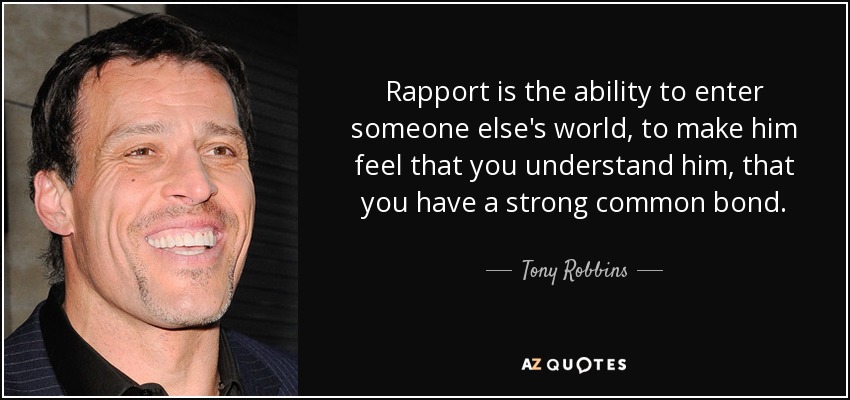How important it is to build trust and rapport ?
rapport-noun
“A close and harmonious relationship in which the people or groups concerned understand each other’s feelings or ideas and communicate well.”
I was going to start off this article with the statement “two very important qualities of citizens in a modern society are trust and rapport”
But then it became rather obvious that any society, modern or primitive would also have required these sort of traits for different levels of interactions amongst its members.
These traits could be classified as some form of advantageous pattern, that functions for the greater good of the people involved in their interactions.
Everybody has patterns, everybody is driven by emotions.
Now days that there is much more recognition of emotional intelligence.Its no longer hard to make the case for emotional intelligence.
But if we were in a business meeting and I said “sounds like your emotional about this” that might be perceived as an insult.
But if I turned around and said “sounds like you are passionate about this” the person I am speaking to will often say “thats right”.
But whats the difference between a passion and emotions ?
Its down to terminology.
Their is an emotional component to every decision we make.
What we care about essentially governs our decisions.. !
Everyone wants to be, or appear to be, “cool and rational”.
There are two things that the other person has, that are important to you.
The stuff that they know is important to you and the stuff they have no idea is important, but it is.
As well, there is never a time when you are not holding a piece of information.
So we end up with two people holding some information and they might not be showing the other side everything they have..or do not have.
Both sides of any form of interaction, especially in sales, and even more especially in high value products like houses, must be comfortable with sharing all the relevant information in an honest way.
There are five steps to build a level of trust with another person.
Active Listening: Listen to the other side and make sure that they are aware you’re listening.
Empathy: You get a real understanding of where the other person is coming from and their feelings.
Rapport: Empathy is what you feel.But rapport is when the other person feels it back.
Now they can start to trust you.
Influence: Now that you are trusted you can work together as a team to solve the problem and suggest a course of action.
Behavioural Change: They now act.
In ways that are beneficial to both parties in the long run !
Many people, especially in sales will make small talk, outline their product, and then skip the first three steps.
And then start at 4 (Influence) and expect the other person to immediately go to 5 Behavioural Change (to purchase the product or service).
And that never works.
No matter how clear you think your idea is, people are not fundamentally rational.
“…business negotiations try to pretend that emotions don’t exist. What’s your best alternative to a negotiated agreement, or ‘BATNA’? That’s to try to be completely unemotional and rational, which is a fiction about negotiation. Human beings are incapable of being rational, regardless… So instead of pretending emotions don’t exist in negotiations, hostage negotiators have actually designed an approach that takes emotions fully into account and uses them to influence situations, which is the reality of the way all negotiations go…” FBI international hostage negotiation, Chris Voss
If you are making an outline for a product or service, the person opposite might be silent because they’re thinking about their own arguments and ideas.
They literally have a voice in their head that’s talking to them and they are not really listening to you.
And then when resistance is met, and they are making their argument to you, you’re thinking about your counter argument, that’s the voice in your head that’s talking to you.
People often don’t walk into a negotiation wanting to hear what the other side has to say.
They walk into a meeting wanting to make a logical argument.
And then they don’t pay attention to emotions and they don’t listen.
Its getting harder and harder now days to convince ostensible strangers, who are meeting initially to trust each other.
Especially over a potential business interest, like the long term advantages of property investment.
Analysis of data indicates that in the 1960s in the USA, 55 per cent thought you could trust others, yet by 1999 that figure had dropped to 34 per cent.
In Australia social trust fell by 8 per cent between 1981 and 1997, and in Britain social trust fell from 56 per cent in 1959 to 44 per cent in 1990 to 30 per cent by 1996.
At Ample Property Solutions we have your best interest at heart.
We value building a relationship first before we proceed with our service and property investment.
We truly believe that by honestly helping others get everything they want out of life, then we will get everything we want out of life in return.
Have a chat to us now, to let us show you how we can help you invest in your future.
Or book ahead for our next seminar in May

